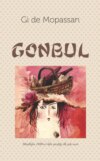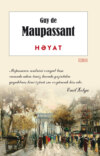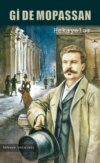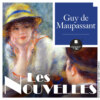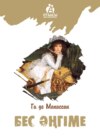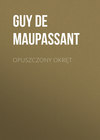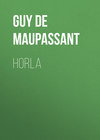Kitabı oku: «Complete Original Short Stories of Guy De Maupassant», sayfa 88
THE DIARY OF A MADMAN
He was dead – the head of a high tribunal, the upright magistrate whose irreproachable life was a proverb in all the courts of France. Advocates, young counsellors, judges had greeted him at sight of his large, thin, pale face lighted up by two sparkling deep-set eyes, bowing low in token of respect.
He had passed his life in pursuing crime and in protecting the weak. Swindlers and murderers had no more redoubtable enemy, for he seemed to read the most secret thoughts of their minds.
He was dead, now, at the age of eighty-two, honored by the homage and followed by the regrets of a whole people. Soldiers in red trousers had escorted him to the tomb and men in white cravats had spoken words and shed tears that seemed to be sincere beside his grave.
But here is the strange paper found by the dismayed notary in the desk where he had kept the records of great criminals! It was entitled: WHY?
20th June, 1851. I have just left court. I have condemned Blondel to death! Now, why did this man kill his five children? Frequently one meets with people to whom the destruction of life is a pleasure. Yes, yes, it should be a pleasure, the greatest of all, perhaps, for is not killing the next thing to creating? To make and to destroy! These two words contain the history of the universe, all the history of worlds, all that is, all! Why is it not intoxicating to kill?
25th June. To think that a being is there who lives, who walks, who runs. A being? What is a being? That animated thing, that bears in it the principle of motion and a will ruling that motion. It is attached to nothing, this thing. Its feet do not belong to the ground. It is a grain of life that moves on the earth, and this grain of life, coming I know not whence, one can destroy at one’s will. Then nothing – nothing more. It perishes, it is finished.
26th June. Why then is it a crime to kill? Yes, why? On the contrary, it is the law of nature. The mission of every being is to kill; he kills to live, and he kills to kill. The beast kills without ceasing, all day, every instant of his existence. Man kills without ceasing, to nourish himself; but since he needs, besides, to kill for pleasure, he has invented hunting! The child kills the insects he finds, the little birds, all the little animals that come in his way. But this does not suffice for the irresistible need to massacre that is in us. It is not enough to kill beasts; we must kill man too. Long ago this need was satisfied by human sacrifices. Now the requirements of social life have made murder a crime. We condemn and punish the assassin! But as we cannot live without yielding to this natural and imperious instinct of death, we relieve ourselves, from time to time, by wars. Then a whole nation slaughters another nation. It is a feast of blood, a feast that maddens armies and that intoxicates civilians, women and children, who read, by lamplight at night, the feverish story of massacre.
One might suppose that those destined to accomplish these butcheries of men would be despised! No, they are loaded with honors. They are clad in gold and in resplendent garments; they wear plumes on their heads and ornaments on their breasts, and they are given crosses, rewards, titles of every kind. They are proud, respected, loved by women, cheered by the crowd, solely because their mission is to shed human blood; They drag through the streets their instruments of death, that the passer-by, clad in black, looks on with envy. For to kill is the great law set by nature in the heart of existence! There is nothing more beautiful and honorable than killing!
30th June. To kill is the law, because nature loves eternal youth. She seems to cry in all her unconscious acts: “Quick! quick! quick!” The more she destroys, the more she renews herself.
2d July. A human being – what is a human being? Through thought it is a reflection of all that is; through memory and science it is an abridged edition of the universe whose history it represents, a mirror of things and of nations, each human being becomes a microcosm in the macrocosm.
3d July. It must be a pleasure, unique and full of zest, to kill; to have there before one the living, thinking being; to make therein a little hole, nothing but a little hole, to see that red thing flow which is the blood, which makes life; and to have before one only a heap of limp flesh, cold, inert, void of thought!
5th August. I, who have passed my life in judging, condemning, killing by the spoken word, killing by the guillotine those who had killed by the knife, I, I, if I should do as all the assassins have done whom I have smitten, I – I – who would know it?
10th August. Who would ever know? Who would ever suspect me, me, me, especially if I should choose a being I had no interest in doing away with?
15th August. The temptation has come to me. It pervades my whole being; my hands tremble with the desire to kill.
22d August. I could resist no longer. I killed a little creature as an experiment, for a beginning. Jean, my servant, had a goldfinch in a cage hung in the office window. I sent him on an errand, and I took the little bird in my hand, in my hand where I felt its heart beat. It was warm. I went up to my room. From time to time I squeezed it tighter; its heart beat faster; this was atrocious and delicious. I was near choking it. But I could not see the blood.
Then I took scissors, short-nail scissors, and I cut its throat with three slits, quite gently. It opened its bill, it struggled to escape me, but I held it, oh! I held it – I could have held a mad dog – and I saw the blood trickle.
And then I did as assassins do – real ones. I washed the scissors, I washed my hands. I sprinkled water and took the body, the corpse, to the garden to hide it. I buried it under a strawberry-plant. It will never be found. Every day I shall eat a strawberry from that plant. How one can enjoy life when one knows how!
My servant cried; he thought his bird flown. How could he suspect me? Ah! ah!
25th August. I must kill a man! I must —
30th August. It is done. But what a little thing! I had gone for a walk in the forest of Vernes. I was thinking of nothing, literally nothing. A child was in the road, a little child eating a slice of bread and butter.
He stops to see me pass and says, “Good-day, Mr. President.”
And the thought enters my head, “Shall I kill him?”
I answer: “You are alone, my boy?”
“Yes, sir.”
“All alone in the wood?”
“Yes, sir.”
The wish to kill him intoxicated me like wine. I approached him quite softly, persuaded that he was going to run away. And, suddenly, I seized him by the throat. He looked at me with terror in his eyes – such eyes! He held my wrists in his little hands and his body writhed like a feather over the fire. Then he moved no more. I threw the body in the ditch, and some weeds on top of it. I returned home, and dined well. What a little thing it was! In the evening I was very gay, light, rejuvenated; I passed the evening at the Prefect’s. They found me witty. But I have not seen blood! I am tranquil.
31st August. The body has been discovered. They are hunting for the assassin. Ah! ah!
1st September. Two tramps have been arrested. Proofs are lacking.
2d September. The parents have been to see me. They wept! Ah! ah!
6th October. Nothing has been discovered. Some strolling vagabond must have done the deed. Ah! ah! If I had seen the blood flow, it seems to me I should be tranquil now! The desire to kill is in my blood; it is like the passion of youth at twenty.
20th October. Yet another. I was walking by the river, after breakfast. And I saw, under a willow, a fisherman asleep. It was noon. A spade was standing in a potato-field near by, as if expressly, for me.
I took it. I returned; I raised it like a club, and with one blow of the edge I cleft the fisherman’s head. Oh! he bled, this one! Rose-colored blood. It flowed into the water, quite gently. And I went away with a grave step. If I had been seen! Ah! ah! I should have made an excellent assassin.
25th October. The affair of the fisherman makes a great stir. His nephew, who fished with him, is charged with the murder.
26th October. The examining magistrate affirms that the nephew is guilty. Everybody in town believes it. Ah! ah!
27th October. The nephew makes a very poor witness. He had gone to the village to buy bread and cheese, he declared. He swore that his uncle had been killed in his absence! Who would believe him?
28th October. The nephew has all but confessed, they have badgered him so. Ah! ah! justice!
15th November. There are overwhelming proofs against the nephew, who was his uncle’s heir. I shall preside at the sessions.
25th January. To death! to death! to death! I have had him condemned to death! Ah! ah! The advocate-general spoke like an angel! Ah! ah! Yet another! I shall go to see him executed!
10th March. It is done. They guillotined him this morning. He died very well! very well! That gave me pleasure! How fine it is to see a man’s head cut off!
Now, I shall wait, I can wait. It would take such a little thing to let myself be caught.
The manuscript contained yet other pages, but without relating any new crime.
Alienist physicians to whom the awful story has been submitted declare that there are in the world many undiscovered madmen as adroit and as much to be feared as this monstrous lunatic.
THE MASK
There was a masquerade ball at the Elysee-Montmartre that evening. It was the ‘Mi-Careme’, and the crowds were pouring into the brightly lighted passage which leads to the dance ball, like water flowing through the open lock of a canal. The loud call of the orchestra, bursting like a storm of sound, shook the rafters, swelled through the whole neighborhood and awoke, in the streets and in the depths of the houses, an irresistible desire to jump, to get warm, to have fun, which slumbers within each human animal.
The patrons came from every quarter of Paris; there were people of all classes who love noisy pleasures, a little low and tinged with debauch. There were clerks and girls – girls of every description, some wearing common cotton, some the finest batiste; rich girls, old and covered with diamonds, and poor girls of sixteen, full of the desire to revel, to belong to men, to spend money. Elegant black evening suits, in search of fresh or faded but appetizing novelty, wandering through the excited crowds, looking, searching, while the masqueraders seemed moved above all by the desire for amusement. Already the far-famed quadrilles had attracted around them a curious crowd. The moving hedge which encircled the four dancers swayed in and out like a snake, sometimes nearer and sometimes farther away, according to the motions of the performers. The two women, whose lower limbs seemed to be attached to their bodies by rubber springs, were making wonderful and surprising motions with their legs. Their partners hopped and skipped about, waving their arms about. One could imagine their panting breath beneath their masks.
One of them, who had taken his place in the most famous quadrille, as substitute for an absent celebrity, the handsome “Songe-au-Gosse,” was trying to keep up with the tireless “Arete-de-Veau” and was making strange fancy steps which aroused the joy and sarcasm of the audience.
He was thin, dressed like a dandy, with a pretty varnished mask on his face. It had a curly blond mustache and a wavy wig. He looked like a wax figure from the Musee Grevin, like a strange and fantastic caricature of the charming young man of fashion plates, and he danced with visible effort, clumsily, with a comical impetuosity. He appeared rusty beside the others when he tried to imitate their gambols: he seemed overcome by rheumatism, as heavy as a great Dane playing with greyhounds. Mocking bravos encouraged him. And he, carried away with enthusiasm, jigged about with such frenzy that suddenly, carried away by a wild spurt, he pitched head foremost into the living wall formed by the audience, which opened up before him to allow him to pass, then closed around the inanimate body of the dancer, stretched out on his face.
Some men picked him up and carried him away, calling for a doctor. A gentleman stepped forward, young and elegant, in well-fitting evening clothes, with large pearl studs. “I am a professor of the Faculty of Medicine,” he said in a modest voice. He was allowed to pass, and he entered a small room full of little cardboard boxes, where the still lifeless dancer had been stretched cut on some chairs. The doctor at first wished to take off the mask, and he noticed that it was attached in a complicated manner, with a perfect network of small metal wires which cleverly bound it to his wig and covered the whole head. Even the neck was imprisoned in a false skin which continued the chin and was painted the color of flesh, being attached to the collar of the shirt.
All this had to be cut with strong scissors. When the physician had slit open this surprising arrangement, from the shoulder to the temple, he opened this armor and found the face of an old man, worn out, thin and wrinkled. The surprise among those who had brought in this seemingly young dancer was so great that no one laughed, no one said a word.
All were watching this sad face as he lay on the straw chairs, his eyes closed, his face covered with white hair, some long, falling from the forehead over the face, others short, growing around the face and the chin, and beside this poor head, that pretty little, neat varnished, smiling mask.
The man regained consciousness after being inanimate for a long time, but he still seemed to be so weak and sick that the physician feared some dangerous complication. He asked: “Where do you live?”
The old dancer seemed to be making an effort to remember, and then he mentioned the name of the street, which no one knew. He was asked for more definite information about the neighborhood. He answered with a great slowness, indecision and difficulty, which revealed his upset state of mind. The physician continued:
“I will take you home myself.”
Curiosity had overcome him to find out who this strange dancer, this phenomenal jumper might be. Soon the two rolled away in a cab to the other side of Montmartre.
They stopped before a high building of poor appearance. They went up a winding staircase. The doctor held to the banister, which was so grimy that the hand stuck to it, and he supported the dizzy old man, whose forces were beginning to return. They stopped at the fourth floor.
The door at which they had knocked was opened by an old woman, neat looking, with a white nightcap enclosing a thin face with sharp features, one of those good, rough faces of a hard-working and faithful woman. She cried out:
“For goodness sake! What’s the matter?”
He told her the whole affair in a few words. She became reassured and even calmed the physician himself by telling him that the same thing had happened many times. She said: “He must be put to bed, monsieur, that is all. Let him sleep and tomorrow he will be all right.”
The doctor continued: “But he can hardly speak.”
“Oh! that’s just a little drink, nothing more; he has eaten no dinner, in order to be nimble, and then he took a few absinthes in order to work himself up to the proper pitch. You see, drink gives strength to his legs, but it stops his thoughts and words. He is too old to dance as he does. Really, his lack of common sense is enough to drive one mad!”
The doctor, surprised, insisted:
“But why does he dance like that at his age?”
She shrugged her shoulders and turned red from the anger which was slowly rising within her and she cried out:
“Ah! yes, why? So that the people will think him young under his mask; so that the women will still take him for a young dandy and whisper nasty things into his ears; so that he can rub up against all their dirty skins, with their perfumes and powders and cosmetics. Ah! it’s a fine business! What a life I have had for the last forty years! But we must first get him to bed, so that he may have no ill effects. Would you mind helping me? When he is like that I can’t do anything with him alone.”
The old man was sitting on his bed, with a tipsy look, his long white hair falling over his face. His companion looked at him with tender yet indignant eyes. She continued:
“Just see the fine head he has for his age, and yet he has to go and disguise himself in order to make people think that he is young. It’s a perfect shame! Really, he has a fine head, monsieur! Wait, I’ll show it to you before putting him to bed.”
She went to a table on which stood the washbasin a pitcher of water, soap and a comb and brush. She took the brush, returned to the bed and pushed back the drunkard’s tangled hair. In a few seconds she made him look like a model fit for a great painter, with his long white locks flowing on his neck. Then she stepped back in order to observe him, saying: “There! Isn’t he fine for his age?”
“Very,” agreed the doctor, who was beginning to be highly amused.
She added: “And if you had known him when he was twenty-five! But we must get him to bed, otherwise the drink will make him sick. Do you mind drawing off that sleeve? Higher-like that-that’s right. Now the trousers. Wait, I will take his shoes off – that’s right. Now, hold him upright while I open the bed. There – let us put him in. If you think that he is going to disturb himself when it is time for me to get in you are mistaken. I have to find a little corner any place I can. That doesn’t bother him! Bah! You old pleasure seeker!”
As soon as he felt himself stretched out in his sheets the old man closed his eyes, opened them closed them again, and over his whole face appeared an energetic resolve to sleep. The doctor examined him with an ever-increasing interest and asked: “Does he go to all the fancy balls and try to be a young man?” “To all of them, monsieur, and he comes back to me in the morning in a deplorable condition. You see, it’s regret that leads him on and that makes him put a pasteboard face over his own. Yes, the regret of no longer being what he was and of no longer making any conquests!”
He was sleeping now and beginning to snore. She looked at him with a pitying expression and continued: “Oh! how many conquests that man has made! More than one could believe, monsieur, more than the finest gentlemen of the world, than all the tenors and all the generals.”
“Really? What did he do?”
“Oh! it will surprise you at first, as you did not know him in his palmy days. When I met him it was also at a ball, for he has always frequented them. As soon as I saw him I was caught – caught like a fish on a hook. Ah! how pretty he was, monsieur, with his curly raven locks and black eyes as large as saucers! Indeed, he was good looking! He took me away that evening and I never have left him since, never, not even for a day, no matter what he did to me! Oh! he has often made it hard for me!”
The doctor asked: “Are you married?”
She answered simply: “Yes, monsieur, otherwise he would have dropped me as he did the others. I have been his wife and his servant, everything, everything that he wished. How he has made me cry – tears which I did not show him; for he would tell all his adventures to me – to me, monsieur – without understanding how it hurt me to listen.”
“But what was his business?”
“That’s so. I forgot to tell you. He was the foreman at Martel’s – a foreman such as they never had had – an artist who averaged ten francs an hour.”
“Martel? – who is Martel?”
“The hairdresser, monsieur, the great hairdresser of the Opera, who had all the actresses for customers. Yes, sir, all the smartest actresses had their hair dressed by Ambrose and they would give him tips that made a fortune for him. Ah! monsieur, all the women are alike, yes, all of them. When a man pleases their fancy they offer themselves to him. It is so easy – and it hurt me so to hear about it. For he would tell me everything – he simply could not hold his tongue – it was impossible. Those things please the men so much! They seem to get even more enjoyment out of telling than doing.
“When I would see him coming in the evening, a little pale, with a pleased look and a bright eye, would say to myself: ‘One more. I am sure that he has caught one more.’ Then I felt a wild desire to question him and then, again, not to know, to stop his talking if he should begin. And we would look at each other.
“I knew that he would not keep still, that he would come to the point. I could feel that from his manner, which seemed to laugh and say: ‘I had a fine adventure to-day, Madeleine.’ I would pretend to notice nothing, to guess nothing; I would set the table, bring on the soup and sit down opposite him.
“At those times, monsieur, it was as if my friendship for him had been crushed in my body as with a stone. It hurt. But he did not understand; he did not know; he felt a need to tell all those things to some one, to boast, to show how much he was loved, and I was the only one he had to whom he could talk-the only one. And I would have to listen and drink it in, like poison.
“He would begin to take his soup and then he would say: ‘One more, Madeleine.’
“And I would think: ‘Here it comes! Goodness! what a man! Why did I ever meet him?’
“Then he would begin: ‘One more! And a beauty, too.’ And it would be some little one from the Vaudeville or else from the Varietes, and some of the big ones, too, some of the most famous. He would tell me their names, how their apartments were furnished, everything, everything, monsieur. Heartbreaking details. And he would go over them and tell his story over again from beginning to end, so pleased with himself that I would pretend to laugh so that he would not get angry with me.
“Everything may not have been true! He liked to glorify himself and was quite capable of inventing such things! They may perhaps also have been true! On those evenings he would pretend to be tired and wish to go to bed after supper. We would take supper at eleven, monsieur, for he could never get back from work earlier.
“When he had finished telling about his adventure he would walk round the room and smoke cigarettes, and he was so handsome, with his mustache and curly hair, that I would think: ‘It’s true, just the same, what he is telling. Since I myself am crazy about that man, why should not others be the same?’ Then I would feel like crying, shrieking, running away and jumping out of the window while I was clearing the table and he was smoking. He would yawn in order to show how tired he was, and he would say two or three times before going to bed: ‘Ah! how well I shall sleep this evening!’
“I bear him no ill will, because he did not know how he was hurting me. No, he could not know! He loved to boast about the women just as a peacock loves to show his feathers. He got to the point where he thought that all of them looked at him and desired him.
“It was hard when he grew old. Oh, monsieur, when I saw his first white hair I felt a terrible shock and then a great joy – a wicked joy – but so great, so great! I said to myself: ‘It’s the end-it’s the end.’ It seemed as if I were about to be released from prison. At last I could have him to myself, all to myself, when the others would no longer want him.
“It was one morning in bed. He was still sleeping and I leaned over him to wake him up with a kiss, when I noticed in his curls, over his temple, a little thread which shone like silver. What a surprise! I should not have thought it possible! At first I thought of tearing it out so that he would not see it, but as I looked carefully I noticed another farther up. White hair! He was going to have white hair! My heart began to thump and perspiration stood out all over me, but away down at the bottom I was happy.
“It was mean to feel thus, but I did my housework with a light heart that morning, without waking him up, and, as soon as he opened his eyes of his own accord, I said to him: ‘Do you know what I discovered while you were asleep?’
“‘No.’
“‘I found white hairs.’
“He started up as if I had tickled him and said angrily: ‘It’s not true!’
“‘Yes, it is. There are four of them over your left temple.’
“He jumped out of bed and ran over to the mirror. He could not find them. Then I showed him the first one, the lowest, the little curly one, and I said: ‘It’s no wonder, after the life that you have been leading. In two years all will be over for you.’
“Well, monsieur, I had spoken true; two years later one could not recognize him. How quickly a man changes! He was still handsome, but he had lost his freshness, and the women no longer ran after him. Ah! what a life I led at that time! How he treated me! Nothing suited him. He left his trade to go into the hat business, in which he ate up all his money. Then he unsuccessfully tried to be an actor, and finally he began to frequent public balls. Fortunately, he had had common sense enough to save a little something on which we now live. It is sufficient, but it is not enormous. And to think that at one time he had almost a fortune.
“Now you see what he does. This habit holds him like a frenzy. He has to be young; he has to dance with women who smell of perfume and cosmetics. You poor old darling!”
She was looking at her old snoring husband fondly, ready to cry. Then, gently tiptoeing up to him, she kissed his hair. The physician had risen and was getting ready to leave, finding nothing to say to this strange couple. Just as he was leaving she asked:
“Would you mind giving me your address? If he should grow worse, I could go and get you.”



